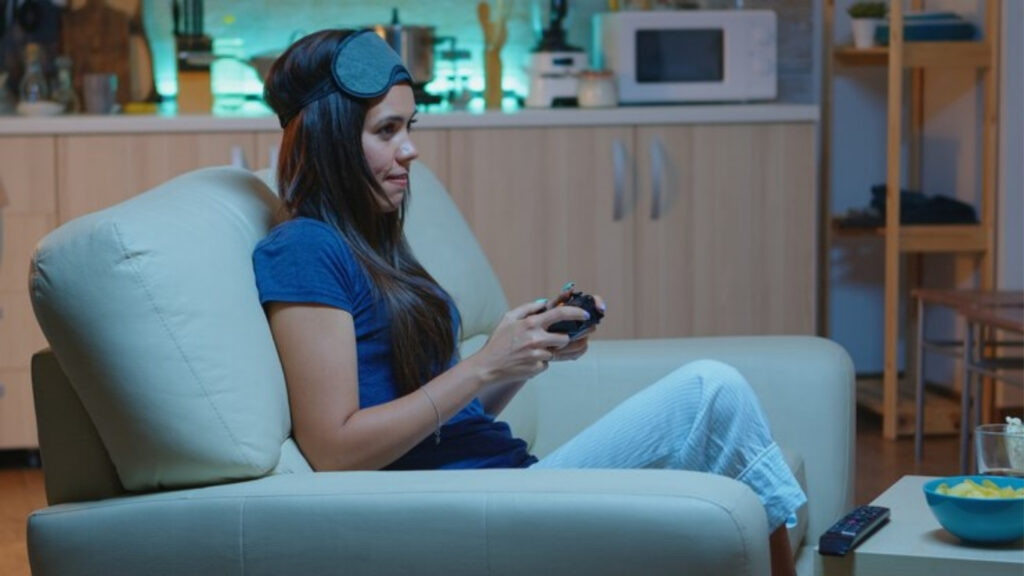🧠 Introduction
Online video gaming has evolved from a niche pastime to a global phenomenon. With millions of players connecting across the world, gaming offers immersive experiences, challenges, and social interaction Online Video Gaming and Mental Health.
But how does online video gaming truly affect mental health? Is it a powerful tool for well-being—or a trigger for anxiety and isolation?
This article dives deep into the psychological effects of gaming—backed by research, real-life stories, and expert advice.
📑 Table of Contents
- Introduction
- The Rise of Online Gaming
- Positive Effects of Online Gaming on Mental Health
- Potential Risks and Negative Impacts
- Scientific Studies and Mental Health Insights
- How to Game Responsibly
- Mental Health Resources for Gamers
- Conclusion
- FAQs
🎮 The Rise of Online Gaming
The video game industry has exploded over the last two decades:
- Over 3.2 billion people worldwide play video games (Statista, 2024).
- Platforms like Steam, Xbox Live, and PlayStation Network host massive online communities.
- Esports and live streaming (Twitch, YouTube Gaming) have turned gaming into a career path for many.
With this rise, mental health conversations have gained prominence. Understanding gaming’s role in emotional and psychological health is more important than ever.
✅ Positive Effects of Online Gaming on Mental Health
Despite public skepticism, gaming offers several mental health benefits when used mindfully.
1. Stress Relief and Relaxation
Games like Animal Crossing or Stardew Valley provide calming environments. For many, they serve as a digital escape to unwind after a long day.
“Gaming helped me through my depression by offering me a safe space to disconnect,” — Rachel B., gamer and mental health advocate.
2. Cognitive Skill Development
Certain genres (puzzle, strategy, RPGs) improve:
- Problem-solving abilities
- Spatial awareness
- Memory and multitasking
Games like Portal or Civilization VI challenge the brain, promoting cognitive flexibility.
3. Social Connectivity
Online multiplayer games (e.g., Fortnite, Among Us) foster teamwork and friendships across borders. This connectivity can combat loneliness, especially for teens and young adults.
4. A Sense of Achievement
Leveling up, completing missions, or winning matches provides instant gratification, enhancing motivation and self-esteem.
⚠ Potential Risks and Negative Impacts
Not all effects are positive. Excessive or unregulated gaming can trigger or worsen mental health issues.
1. Gaming Addiction and Dependency
The World Health Organization (WHO) classifies “Gaming Disorder” as a mental health condition marked by:
- Loss of control over gaming habits
- Prioritizing gaming over daily responsibilities
- Continued gaming despite negative consequences
2. Anxiety and Depression
While moderate gaming can reduce stress, excessive play (especially late at night) has been linked to:
- Sleep disturbances
- Mood swings
- Increased social withdrawal
3. Aggression and Desensitization
Although still debated, exposure to violent games (e.g., Grand Theft Auto V) may numb emotional response to violence or encourage hostile behavior in predisposed individuals.
4. Cyberbullying and Online Toxicity
Competitive games often harbor toxic environments—racism, sexism, trolling—which can negatively impact a player’s mental well-being.
🧬 Scientific Studies and Mental Health Insights
Let’s look at what research says:
- A 2021 Oxford University study found no direct correlation between time spent gaming and negative mental health outcomes.
- Another meta-analysis (APA, 2023) revealed that moderate gaming may actually decrease symptoms of depression in teens.
- However, problematic gaming behaviors were consistently associated with increased levels of anxiety, loneliness, and poor academic performance.
Conclusion? The type of game, time spent, and individual predisposition matter more than gaming itself.
🧭 How to Game Responsibly
Healthy gaming requires balance and boundaries. Here’s how:
🎯 Set Time Limits
Use parental controls or screen-time apps to restrict hours played.
📅 Prioritize Responsibilities
School, work, and social life come first—gaming is a reward, not an escape.
💬 Communicate Openly
Parents and guardians should engage in conversations, not confrontations.
🧘♀️ Take Breaks
The 20-20-20 rule: Every 20 minutes, look 20 feet away for 20 seconds to reduce eye strain and mental fatigue.
🧑⚕️ Seek Help If Needed
If gaming affects sleep, relationships, or emotions, consult a mental health professional familiar with digital addiction.
🧠 Mental Health Resources for Gamers
- Take This (https://www.takethis.org): Nonprofit promoting mental health in gaming communities.
- Games and Online Harassment Hotline: 24/7 text support for gamers facing online abuse.
- Therapists Specializing in Digital Addiction: Many now offer virtual sessions tailored for tech/gaming issues.
🏁 Conclusion
Online video gaming isn’t inherently harmful or helpful—it’s how, why, and how much you play that determines its impact.
Used responsibly, gaming can boost mental well-being, offer community, and spark joy. But like any tool, balance is key.
🎯 Action Step: Take a moment to reflect on your gaming habits. Are they helping or hindering your mental health? Share this article with a fellow gamer and start the conversation.
❓ FAQs
Q. Is online gaming good for mental health?
A. Yes, when used moderately, it can improve mood, reduce stress, and enhance cognitive skills.
Q. Can gaming cause anxiety or depression?
A. Excessive gaming can contribute to mental health issues, especially when it replaces real-life interactions or sleep.
Q. How many hours of gaming per day is healthy?
A. Experts recommend 1–2 hours daily for children and teens, and moderation for adults based on lifestyle.
Q. Are there any games specifically designed for mental health?
A. Yes! Games like Sea of Solitude, Celeste, and Hellblade: Senua’s Sacrifice tackle mental health themes directly.
Q. Where can I get help if I’m addicted to gaming?
A. Reach out to a licensed therapist or check out resources like Game Quitters, Take This, and your local mental health helpline.






